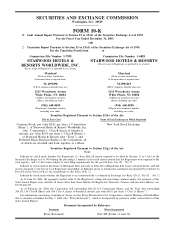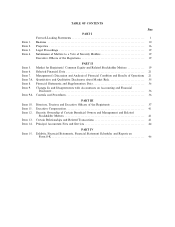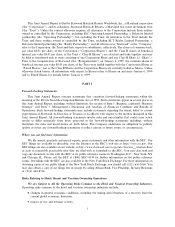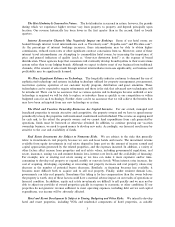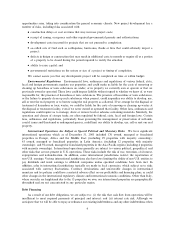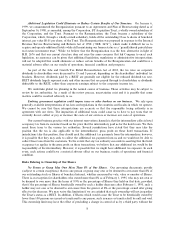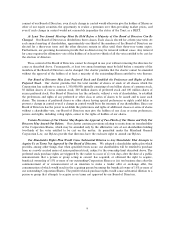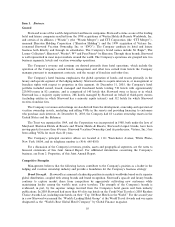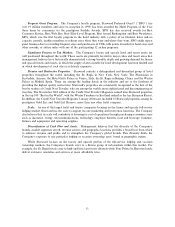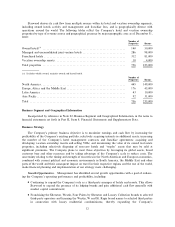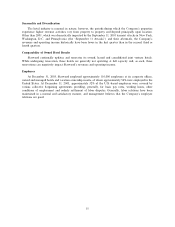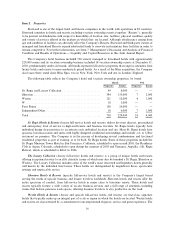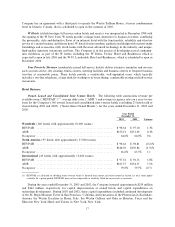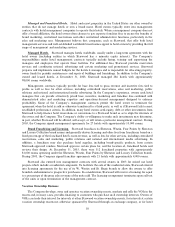Starwood 2003 Annual Report Download - page 18
Download and view the complete annual report
Please find page 18 of the 2003 Starwood annual report below. You can navigate through the pages in the report by either clicking on the pages listed below, or by using the keyword search tool below to find specific information within the annual report.Additional Legislation Could Eliminate or Reduce Certain BeneÑts of Our Structure. On January 6,
1999, we consummated the Reorganization pursuant to an Agreement and Plan of Restructuring dated as of
September 16, 1998, as amended, among the Corporation, ST Acquisition Trust, a wholly owned subsidiary of
the Corporation, and the Trust. Pursuant to the Reorganization, the Trust became a subsidiary of the
Corporation, which, through a wholly-owned subsidiary, holds all the outstanding Class A shares of beneÑcial
interest, par value $0.01 per share, of the Trust. The Reorganization was proposed in response to the Internal
Revenue Service Restructuring and Reform Act of 1998 (""H.R. 2676''), which made it diÇcult for us to
acquire and operate additional hotels while still maintaining our former status as a ""grandfathered paired share
real estate investment trust.'' While we believe that the Reorganization was the best alternative in light of
H.R. 2676 and that our current structure does not raise the same concerns that led Congress to enact such
legislation, no assurance can be given that additional legislation, regulations or administrative interpretations
will not be adopted that would eliminate or reduce certain beneÑts of the Reorganization and could have a
material adverse eÅect on our results of operations, Ñnancial condition and prospects.
As part of the Jobs and Growth Tax Relief Reconciliation Act of 2003, the tax rates on corporate
dividends to shareholders were decreased to 15 and 5 percent, depending on the shareholders' individual tax
brackets. However, dividends paid by a REIT are generally not eligible for the reduced dividend tax rate.
REIT dividends largely represent rents and other income that are passed through to shareholders as dividends
deductible to the REIT, rather than corporate earnings subject to the corporate income tax.
We undertake global tax planning in the normal course of business. These activities may be subject to
review by tax authorities. As a result of the review process, uncertainties exist and it is possible that some
matters could be resolved adversely to us.
Evolving government regulation could impose taxes or other burdens on our business. We rely upon
generally available interpretations of tax laws and regulations in the countries and locales in which we operate.
We cannot be sure that these interpretations are accurate or that the responsible taxing authority is in
agreement with our views. The imposition of additional taxes could cause us to have to pay taxes that we
currently do not collect or pay or increase the costs of our services or increase our costs of operations.
Our current business practice with our internet reservation channels is that the intermediary collects hotel
occupancy tax from its customer based on the price that the intermediary paid us for the hotel room. We then
remit these taxes to the various tax authorities. Several jurisdictions have stated that they may take the
position that the tax is also applicable to the intermediaries' gross proÑt on these hotel transactions. If
jurisdictions take this position, they should seek the additional tax payments from the intermediary; however,
it is possible that they may seek to collect the additional tax payment from us and we would not be able to
collect these taxes from the customers. To the extent that any tax authority succeeds in asserting that the hotel
occupancy tax applies to the gross proÑt on these transactions, we believe that any additional tax would be the
responsibility of the intermediary. However, it is possible that we might have additional tax exposure. In such
event, such actions could have a material adverse eÅect on our business, results of operations and Ñnancial
condition.
Risks Relating to Ownership of Our Shares
No Person or Group May Own More Than 8% of Our Shares. Our governing documents provide
(subject to certain exceptions) that no one person or group may own or be deemed to own more than 8% of
our outstanding stock or Shares of beneÑcial interest, whether measured by vote, value or number of Shares.
There is an exception for shareholders who owned more than 8% as of February 1, 1995, who may not own or
be deemed to own more than the lesser of 9.9% or the percentage of Shares they held on that date, provided,
that if the percentage of Shares beneÑcially owned by such a holder decreases after February 1, 1995, such a
holder may not own or be deemed to own more than the greater of 8% or the percentage owned after giving
eÅect to the decrease. We may waive this limitation if we are satisÑed that such ownership will not jeopardize
the Trust's status as a REIT. In addition, if Shares which would cause the Trust to be beneÑcially owned by
fewer than 100 persons are issued or transferred to any person, such issuance or transfer shall be null and void.
This ownership limit may have the eÅect of precluding a change in control of us by a third party without the
8



